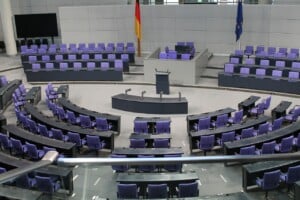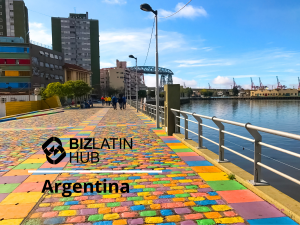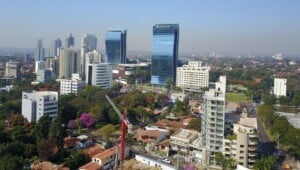Smartphones, smart homes, smart roads and now smart cities: the ‘smart’ revolution has seized the world’s attention. With the use of big data, connectivity and the internet, cities are becoming reflections of the people who live there, creating a more habitable and efficient space to live in. Subsectors of Latin America’s emerging tech industries are now being incorporated into community-wide matrices.
A United Nations study predicts that 68% of world population will be living in urban environments by 2050. Government investment into research and development is crucial at this stage, to pre-empt the inevitable update on urban performance.
We take a look at the characteristics of smart city innovation and initiatives in Latin America, and how businesses can get ahead of the curve by investing in this industry now.
What is a smart city?

Smart cities incorporate information and communication technologies (ICT) to enhance the efficiency of urban services, whilst also improving citizen welfare. A wide range of ICT applications are used to reduce costs and resource use, as well as increase the communication between government and citizens.
Not all countries have the same vision for smart cities. Some propose entirely new-build, stand alone cities in their territories, whilst others seek to incorporate new technology into an existing city. No matter how small the initiative, the industry of making urban spaces more habitable and efficient is one estimated to be worth US$1.5 trillion by the year 2025.
Smart cities disrupt consumption patterns
Efficiency and sustainability are at the heart of the smart city ideology. Consumption of gas, electricity and water can all be assessed for sustainable substitute potential, both at a micro and macro level. This helps both inhabitants and companies reduce their carbon footprint individually, whilst also feeding data to the government on civilian habits.
Gathering data on homes and companies can change the way governments approach their public policy agenda, import and export behaviour, and also how they look at carbon emissions. Knowing rather than estimating their use of natural resources has allowed certain governments to plan their future consumption levels and find alternative energy sources.
Waste management

Environmentally friendly waste management is also something that has been aided by smart technology. Collection, separation, transportation and treatment are the key areas smart cities have isolated, in order to break down the process and individually make each area eco-friendlier and more efficient. The simple alert that appears on a waste administrator’s screen when a bin is full allows them to be emptied before they overflow. This also enables waste managers to quantify precisely the amount of landfill waste and plastic recycling a community is producing.
Every year, smart cities are raising the bar on standards, incorporating new technologies and practices into their day-to-day fight to reduce their carbon footprint.
Well-being and state of mind
As well as improving the environmental habitat around them, smart cities seek to improve the well-being of their citizens. Numerous studies have proven urban environments can have negative effects on human well-being, both mentally and physically. Anxiety- and stress-related conditions and disorders have been shown to spike in densely populated areas. Proof of high carbon-emitting cities causing health problems is widespread.
However, through investment into research and into experimental infrastructure initiatives, the knowledge is becoming more widespread on how to improve the well-being of citizens on both a physical and mental capacity.
Investing in economic efficiency
Smart cities produce long-term economic efficiency, validating the upfront investment in urban development. The initial investment in smart cities is large, incorporating extensive initial research, new technology manufacturing, and infrastructure. Nevertheless, it is proven that smart cities do start to produce economically beneficial results once the data collected has been put into use.
For instance, simple examination techniques of the proportion of citizens who recycle aluminum separate to cardboard can save the government millions in the long term. It is a case of collating individual habits into data, to then use that to demonstrate and analyse macro trends across society as a whole.
Smart governance: incorporating data analysis
Smart governance is the act of interpreting data to help direct the way forward for government policies and initiatives. By reading and responding to data gathered by smart technology in the city, a government can better understand its citizen’s habits. Denmark is one leading example in the efficient application of building key insights from community gathered data.

Business opportunities in Latin America
The opportunities which stem from smart city construction and urban improvement in general are enormous. Construction, artificial intelligence, technology manufacture, real estate and countless other markets are all ones expected to grow with further smart city research and development.
Currently, Latin American cities all perform fairly low on the smart cities index with Sao Paulo being the ‘smartest’, closely followed by Mexico City.
With the slow decline of the natural resource industries in Latin America, governments are investing more into artificial intelligence and tech manufacturing industries. In addition to this, Huawei’s renewed interest in the region and the announcement of the Belt and Road initiative being rolled out to Latin America reinforces the idea that tech and AI are on the horizons of Latin American markets.
With further investment into technology and innovation, Latin American cities will adopt smart city concepts by osmosis. Businesses working in sustainability, technology and innovation or digitalization areas would benefit greatly from engaging with Latin American urbanism initiatives, and positioning themselves as early and leading providers to governments bolstering their smart city capability.
Contact us to get started
Smart cities are moving to Latin America’s urban populations, and businesses should consider how they could expand to this region to prepare for the impending mass technological uptake.
We’ve been assisting businesses to enter Latin American markets for 5 years, and are now a leader in this space. Our team of expatriate and local professionals offer a full suite of market entry and back-office services to ensure businesses are prepared for launch in their market of choice.
Reach out to us today here at Biz Latin Hub for a personalized quote that meets your business needs, and advice on your next steps towards commercial success.





